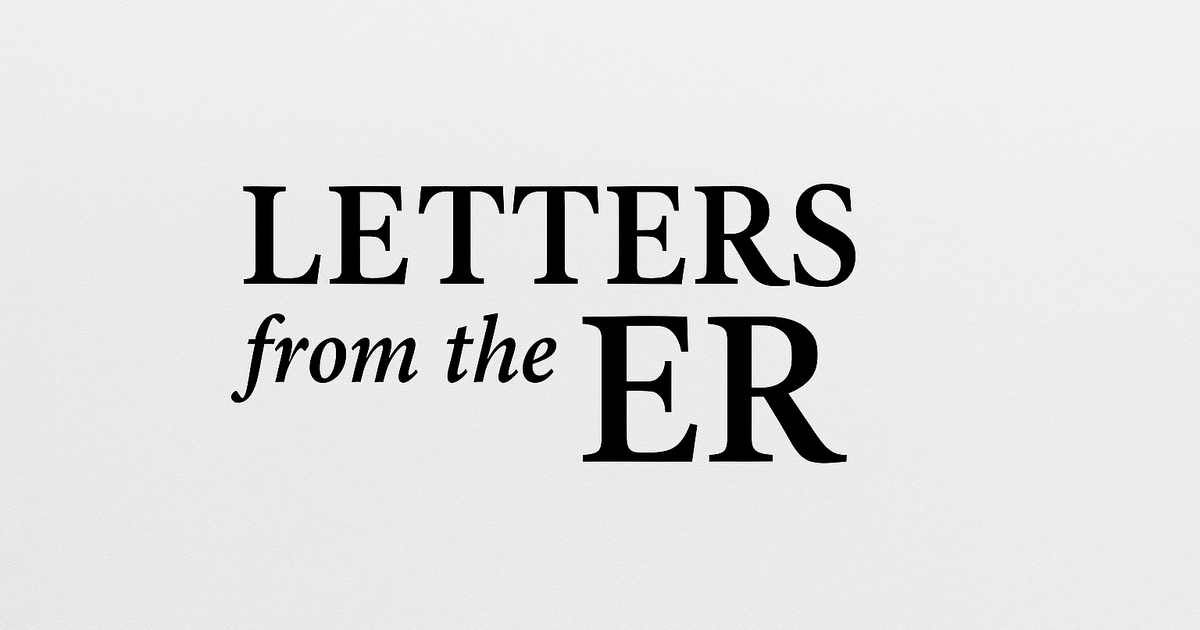- Dr. Adarsh Nath | Letters from the ER
- Posts
- The Bleed that Broke the Silence
The Bleed that Broke the Silence
Letter #4

Prefer to listen instead?
This letter is now available as a podcast episode on Spotify/Apple Podcasts.
Click the link below and read along with me.
The Silence I Grew Up In
We didn’t talk much when I was growing up.
My father was always working.
Early mornings. Late nights. Weekends.
Providing. Sacrificing.
Present in duty. Absent in presence.
He showed up in school fees, grocery bags, repaired shoes.
But never quite in words.
I thought love needed to look different.
Louder. Softer.
More like the fathers I saw on TV.
I didn’t understand then that some people love through survival.
The Warning I Shouldn’t Have Said
He’s had hypertension for years.
Numbers like warnings. High.
The compliance? Too low.
He took his meds like he took advice.
From people who weren’t his children.
And definitely not from his son.
The Emergency physician.
When I confronted him once, not as a doctor, but as his son, he snapped:
“You’re not a Cardiologist.”
I snapped back:
“You‘ll only understand when you get a brain bleed.”
I regretted it the moment I said it.
Words sharpened by fear. Thrown without armour.
But the universe heard me.
And it did listen.
Listened too well.
The Call
I had just flown back from a vacation.
Three back-to-back twelve hour night shifts. No sleep. No light.
Then, on my day off, my mother called:
“Your father’s been taken to the hospital.
From work.
He’s not well.”
I called him.
No answer.
Again.
Again.
Again.
Twelve times.
Finally, a voice. Not his.
“He’s being wheeled in for a CT.
His left side is paralysed.”
My world tilted.
It stopped spinning.
Last year, it was my mother with a stroke.
Now him?
I called my work.
Told them everything.
Emergency leave.
Grabbed my keys.
387 kilometers between us.
I started driving.
The Shoulder of the Highway
An hour later, my mother called again.
“Neurologist says it’s a brain bleed.
They moved him to the ICU.”
I wasn’t convinced.
I had to see.
I asked her to find someone who could send me the scan.
She did.
Her former student.
Now a nurse.
She managed to send me the video of the CT.
I pulled over.
Hazard lights blinking. Like a heartbeat.
Watched the grainy black-and-white swirl of my father’s brain.
Right basal ganglia. Small bleed.
The irony carved its way into my chest.
The ICU
I reached the hospital six hours later.
Ran to the ICU.
Security tried to stop me.
“I’m a doctor,” I said.
I wasn’t asking.
I saw him.
BP 190/116 mmHg. On Labetalol infusion.
I called out to him.
He opened his eyes.
Teary.
Slurred, he called my name.
“Things are going to be okay,” I told him.
“Lift your arms. Legs.”
Weak. But moving.
Enough for hope to crawl in.
Recovery
Ten days in the ICU.
Another week in the ward.
Repeat scans. No expansions. No new bleeds.
We took him home.
He didn’t complain. Didn’t break.
He did the work. Physiotherapy. Discipline.
Three anti-hypertensives now.
Instead of one.
Twenty days later after discharge, he stood up.
By himself.
Unsteady.
Unyielding.
What Love Looks Like Now
He still doesn’t say much.
Neither do I.
But these days, silence feels different.
It’s not the silence of distance anymore.
It’s the silence of understanding.
Of two men.
Who’ve carried too much, and said too little.
I used to think love had to be soft to be real.
Now I know it can be quiet. Stubborn.
It can look like a man who worked himself voiceless.
And a son who learned to listen anyway.
He still teaches me.
Not through words.
But through his will.
Through his living.
And in that quiet, wordless way, he says:
“I’m still here.”
And I say:
“So am I.”
“The impediment to action advances action.
What stands in the way becomes the way.”
This is the essence of resilient will - not resisting hardship, but using it.
If this story made you pause, forward it to someone who might need it.
Or invite them to join here:
More soon.
Another moment.
Another reminder that we are still, somehow, human in all of this.
Yours,
Dr. Adarsh Nath,
Letters from the ER
Disclaimer:
Patient details have been changed to protect confidentiality. This is a personal reflection, not medical advice or substitute for professional care.


Reply